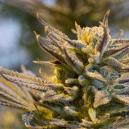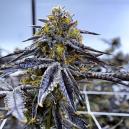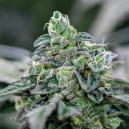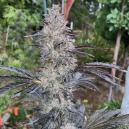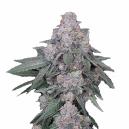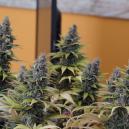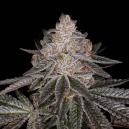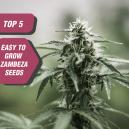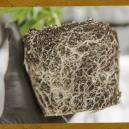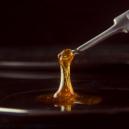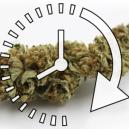Can Cannabis Help Treat Concussion?
Published : Feb 26, 2019

Many former sport stars swear by weed as a way to treat concussive injuries. Are they merely managing their symptoms, or might cannabis have real curative properties on damaged brain tissue? In this article we dive deep into the research on cannabis and concussion to help you figure out if blazing after an injury is the right choice for you.
Concussions can be deeply unsettling. Many sufferers say they don’t feel like themselves, and struggle with tasks that they used to find easy. This lack of control can carry over to the arena of treatment, where for many sufferers the passing time is the only remedy.
During the ‘80s and ‘90s, experts and politicians claimed that cannabis harms the brain and kills brain cells. But might the reverse be true? Following a traumatic injury, could cannabis offer the brain a boost it needs?
Before we dive into these questions, we’ll need to take a closer look at the nature of a concussion.

WHAT IS A CONCUSSION?
A concussion is a mild form of traumatic brain injury (TBI). Concussions can occur following a blow to the head or a blow to the body, which is transmitted to the head. Common causes of concussion include: sports injuries, car accidents, bike accidents and falls.
The brain floats in a protective layer of cerebrospinal fluid, which absorbs all light and moderate impacts to the head. Concussions occur when the head is subjected to a force greater than what this layer can absorb. This can happen through an impact force, as in a direct blow, or an impulsive force, when the head moves and is halted suddenly. Rotational force is often a bigger predictor of concussion severity than linear force.
Concussions most severely affect the diencephalon and the midbrain, including the reticular activating system, which causes the loss of consciousness so often associated with a concussion. The frontal lobe, temporal lobe, corpus callosum, brainstem and limbic system can also be affected. Scientists believe, that when a concussion occurs, the affected brain area experiences increased glucose requirements, while blood flow is insufficient to satisfy the need.
Symptoms of a concussion can include headaches, fuzzy thinking, nausea, anxiety, sensitivity to light, blurry vision, moodiness, and disturbed sleep. Symptoms of a concussion generally fade away within four weeks, though concussions may have longer lasting, but more subtle effects. When the effects of a concussion persist for longer than four weeks, as is the case in 10–20% of cases, the patient is said to be suffering from post-concussive syndrome.
Common treatment for concussion is a period of rest, with plenty of sleep and few cognitively demanding tasks. Experiencing a second concussion while recovering from the first worsens the prognosis, a state of affairs which is, unfortunately, common.
ENDOCANNABINOIDS AND CONCUSSION: A HEALING LINK?
Over the past twenty years, researchers have followed a trail of clues indicating a possible link between endocannabinoids and the brain’s natural healing processes.
A 2001 study found increased levels of a precursor to anandamide—an endocannabinoid—following brain injury. Another study, this one from 2011, found that levels of 2-AG, a naturally abundant endocannabinoid, were increased in rats after TBI. The researchers also found that when 2-AG was administered following TBI, inflammation and edema decreased, speeding up recovery. The researchers emphasized the link between CB1 and CB2 receptors and TBI recovery.
A 2017 study suggested that “endocannabinoid tone” may be crucial for post-stroke recovery, as the CB2 endocannabinoid system encourages the migration of neuroblasts towards the site of damage, preparing the brain for new neuron growth. Stroke research can be cautiously extrapolated to TBI recovery, as similar healing mechanisms may be active in both cases.
These studies could suggest that endocannabinoids can aid in concussion recovery. But does the research bear this out?

CANNABIS AND THE BRAIN
There hasn’t been enough research on the effects of cannabis on brain injury to say conclusively whether cannabis can help. However, there has been some research on cannabis and the brain, and this research can help us circle closer to the question.
One study screened patients admitted for TBI and found that those who tested positive for THC had a far higher survival rate than those who did not (2.4% mortality versus 11.5%). The researchers suggested that the neuroprotective effects of cannabis might play a role. It should be noted that this study was on TBIs of greater severity than concussion, and the study was observational, not experimental, so the results should be applied judiciously.
A 2002 article suggests that plant cannabinoids might be linked to improved outcomes following brain injury. These cannabinoids can help reduce glutamate excitotoxicity, common following concussions, and may increase antioxidant activity.
Evidence for a link between cannabis and concussion recovery continues to mount. One 2014 study showed that mice administered with a microdose of THC experienced reduced inflammation‐induced cognitive damage, particularly in the frontal lobe and hippocampus. Researchers theorized that subperceptual doses of THC could be an effective supplement to conventional treatment for neuroinflammatory conditions, like concussions.
THC is not alone in this regard. CBD has also been shown to have neuroprotective effects. Further to this, CBD is popular among current and former athletes suffering from brain injuries.
In an odd quirk of fate, the US government holds a patent on the use of cannabinoids for the treatment of oxidation associated diseases, including concussion. Some claim the US government has been trying to develop synthetic cannabinoids to target the necessary beneficial receptors, but with little success. It seems that the “entourage effect” of ingesting multiple cannabinoids, THC and CBD chief among them, is extremely important with regards to the set of conditions. Synthetic cannabinoids which exclusively agonize CB1 receptors, for example, may be counterproductive to the healing process.

THE VERDICT
There’s a good deal of evidence that cannabis might produce better outcomes following a traumatic brain injury. The strongest evidence suggests that consuming THC at a microdose level (three to four orders of magnitude below a normal dose) can be beneficial. There is no direct evidence demonstrating benefit, or even lack of harm, from consuming normal quantities of cannabis following a brain injury.
Aside from the direct effects on the brain, those recovering from concussion might find that cannabis helps with symptom management, alleviating the discomfort of nausea, negative mood, or anxiety.
The decision of how to approach cannabis following a concussion is a deeply personal one. Unfortunately, the research on this topic isn’t where it could or should be. As always, it’s best to do your own research and come up with an informed conclusion that’s right for you.














